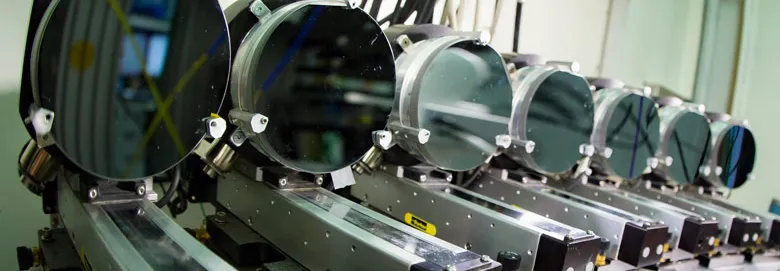
Photo courtesy Andy Freeberg, SLAC National Accelerator Laboratory: Stanford researchers will use cutting-edge spectrometry instruments at SLAC's Stanford Synchrotron Radiation Lightsource to identify catalysts that can convert carbon dioxide into renewable fuels. The work is funded by the university's Global Climate and Energy Project.
Stanford Report - August 12th, 2015 - by Mark Shwartz
The Global Climate and Energy Project (GCEP) at Stanford University has awarded $9.3 million for six new research projects on energy. The funding will be shared by scientists at Stanford and four other universities to develop a suite of promising energy technologies, from a device that extracts power from the night sky to a charcoal-like soil amendment that removes carbon dioxide from the air.
"For more than a decade, GCEP has supported bold ideas for new technologies that significantly reduce greenhouse gas emissions," said GCEP Director Sally Benson, a professor of energy resources engineering at Stanford. "These six projects are potential game changers that could help transform our global energy system in the future."
The six awards bring the total number of GCEP-supported research programs to 127 since the project's launch in 2002. In total, GCEP has awarded $170 million for energy research and other technical activities.
"The projects funded this cycle include a unique mix of energy technologies," said GCEP management committee member Peter Trelenberg, manager of environmental policy & planning at Exxon Mobil. "These promising research efforts have the potential to open up pathways for applying innovative clean-energy approaches in the future."
Stanford awards
The following Stanford faculty members will receive funding to develop new techniques for cooling buildings, improving engine efficiency and generating renewable fuels:
Nighttime radiative cooling: Harvesting the darkness of the universe. Researchers will create a device that generates electricity at night by radiating heat into outer space. This passive energy source, which exploits the large temperature difference between space and Earth, could provide nighttime lighting without batteries or other electrical inputs. Investigator: Shanhui Fan, professor, Department of Electrical Engineering.
Use of mixed combustion/electrochemical energy conversion to achieve efficiencies in excess of 70 percent for transportation-scale engines. This project will demonstrate how engines for transportation can be made at efficiencies above 70 percent, exceeding conventional internal combustion engines and fuel cells used today. Investigator: Chris Edwards, professor, Mechanical Engineering.
Electrochemical tuning of electronic structures for highly active electrocatalysts. The goal of this project is to identify efficient, low-cost metal catalysts that can split water into oxygen and clean-burning hydrogen fuel. Researchers will conduct experiments on several promising catalytic materials using lithium to enhance hydrogen production. Investigators: Yi Cui, associate professor, Materials Science and Engineering; Harold Hwang, professor, Applied Physics.
Sustainable fuel production from carbon dioxide and carbon monoxide. The aim of this research is to discover metal catalysts capable of converting carbon dioxide and its byproducts into methanol and other alcohols for use in sustainable fuels and chemicals. Investigators: Professor Jens Nørskov, Associate Professor Thomas Jaramillo and Professor Stacey Bent, Chemical Engineering; Anders Nilsson, professor, SLAC National Accelerator Laboratory.
Negative-emissions awards
In 2012, GCEP conducted a workshop on the feasibility of removing carbon dioxide from the atmosphere. That workshop resulted in a worldwide call for proposals to develop new carbon-negative technologies. Two research teams outside of Stanford will receive funding in this category:
The pyrolysis-bioenergy-biochar pathway to carbon-negative energy.

Photo courtesy Iowa State University: Carbon-rich biochar is applied at an
agricultural research plot near Lewis, Iowa. Scientists from Iowa State and
other universities received Stanford GCEP funding to study the use of
biochar soil amendment to remove atmospheric carbon dioxide.
Heating plant material slowly without oxygen – a process called pyrolysis – produces a carbon-rich material called biochar. Researchers will study the production of biochar for use as a soil amendment that stores carbon underground instead of allowing carbon dioxide to re-enter the atmosphere as the plant decomposes. Investigators: David Laird, Bruce Babcock, Robert Brown and Dermot Hayes (Iowa State University); David Zilberman (University of California, Berkeley).
Sustainable transportation energy with net-negative carbon emissions. Researchers will conduct an integrated ecological and engineering systems analysis to identify promising transportation fuels with negative carbon emissions. The project will include field studies of potential grassland resources in the United States. Investigators: Eric Larson, Princeton University; Clarence Lehman and David Tilman, University of Minnesota.
GCEP is an industry partnership that supports innovative research on energy technologies to address the challenge of global climate change by reducing greenhouse gas emissions. The project includes five corporate sponsors: ExxonMobil, GE, Schlumberger, DuPont and Bank of America.


